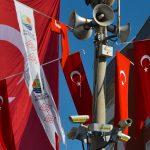Extensive economic ties with autocratic regimes, such as Russia and China, carry a security risk, Jens Stoltenberg, Nato secretary-general said on Tuesday (24 May), telling the global business and political elite in Davos that protecting values is more important than profits.
“Freedom is more important than free trade. The protection of our values is more important than profit,” Stoltenberg said in a speech at the World Economic Forum.
In a blunt warning Stoltenberg said that while he himself has been promoting a globalised economy, economic choices have economic consequences.
Over-relying on the important key commodities, such as energy from Russia, or sharing technologies, like artificial intelligence, and opening the door for foreign control in critical infrastructure such as 5G, makes Nato allies vulnerable, the Nato chief warned.
“The war in Ukraine demonstrates how economic relations with authoritarian regimes can create vulnerabilities,” the Norwegian politician said.
Stoltenberg warned that “we should not trade long-term security needs for short-term economic interests”.
The Nato chief said the war in Ukraine also highlights how being exposed to China carries risks.
He described China as “another authoritarian regime that does not share our values”, and which “undermines the rules-based international order”.
The former prime minister said he was not arguing against trade with China, but that “the control over 5G networks is of vital security importance,” he said.
“We cannot say that in the interest of profits and free trade we just open up those networks also for suppliers that actually are not reliable when it comes to our security,” Stoltenberg added.
He said it was “dangerous” and “wrong” to think that Europe should buy as much gas from Russia as it wants.
“It provides Russia with a tool to intimidate and to use against us, and that has been clearly demonstrated now, I regret to say,” he said.
EU countries have been divided on allowing Chinese companies to run 5G networks, while the US has long pushed European and other countries to exclude Beijing.
Washington sees Chinese telecoms equipment maker Huawei as part of the Chinese government’s global surveillance network. Huawei has denied spying for the Chinese state.
The EU has already put out new policies to screen foreign takeovers in strategic sectors and investigating foreign state aid.
‘Confident’ on Turkey objections
When it comes to Nato’s answer to the Russian invasion of Ukraine, Stoltenberg said he was “confident” that the alliance will be able to overcome concerns raised by Turkey on Finland and Sweden joining Nato.
“All allies agree that Nato enlargement has been a great success, spreading freedom and democracy across Europe,” he said.
Stoltenberg noted that Russian president Vladimir Putin wanted “less Nato” on his borders, but after and launched a war, which resulted in “getting more Nato on his borders”.
By ESZTER ZALAN
Source: EU Observer



